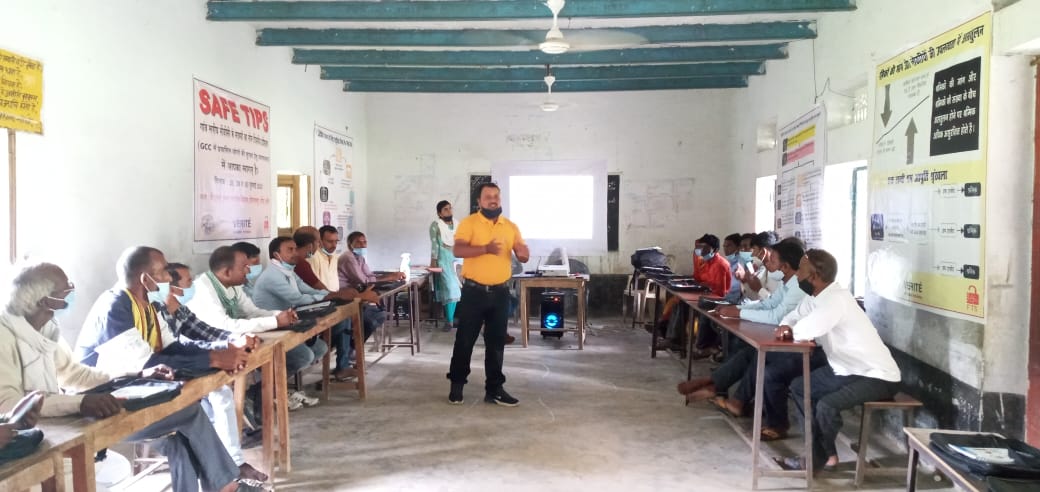Story of a Migrant Worker

West India is one of the largest migration corridors in the world. It's estimated that 9 million Indian migrants are working in the Persian Gulf region. Many are employed in low-profile jobs such as construction jobs, food service, or even domestic positions. Oftentimes, these workers are paid for their hard work and provided with food and housing for their services. But, that's not always the case.
The less fortunate Indian migrant workers are victims of hazardous labor or even labor trafficking. They have no safety net, social security protection, welfare mechanisms, or labor rights. Many of these victims are lured by job agents' promises of good pay, easy work, and foreign labor sponsorship. Yet, reality tells us this is not the case. Most victims find themselves trapped in low-paying domestic jobs, working up to 15-hour days and having to endure verbal or physical abuse.
Free the Slaves and in-country partner MSEMVS have been implementing the ‘Safe Migration to the Gulf Countries' project since December 2020. Under the project, FTS and MSEMVS were focused on educating the public about the issue of migrant workers' rights. Since 2020, the project served 7000 individuals through its community training. Today, we'd like to share the story of Mr. Junaid Ansari, someone who participated in the Safe Migration project.
Junaid Ansari is a resident of Bhudki village Uttar Pradesh, India. Junaid Ansari is a father of two children and is 50 years old. Junaid used to work as a carpet weaver in his village but eventually found that this job could not support his family. Junaid searched for a new career in Uttar Pradesh but found very few job opportunities. So, he set out for an international job.
Between 2015 and 2021, Junaid was able to migrate to Oman for work successfully. Although recruiters charged him thousands of dollars to find international employment, Junaid was well treated by employers and received a reasonable wage for his efforts. After returning from Oman in 2021, Junaid participated in community events hosted by Free the Slaves and MSEMVS, where he learned about safe migration practices and workers' rights.
In December 2021, Junaid decided to work abroad once more. Junaid contacted a local agent that convinced him to take a position as a house helper in Dubai for 1400 Dirhams ($380.00 USD) as a monthly wage. He was told that in addition to a monthly payment, he would also receive food and accommodations. He was promised that the employers were kind, reasonable, and good people who would take care of his visa. With that, Junaid was convinced! After Junaid paid his recruitment fee, he was ready to begin work.
Upon reaching Dubai, Junaid realized that he had been lied to. He was not sent to a beautiful home with kind employers, but rather to a perfume factory. In the factory, he and other migrants were forced to work 12 hours daily. If any of the migrant workers spoke against the factory owner, they would receive verbal abuse, physical abuse, or have their pay withheld.
But all hope was not lost – Junaid remembered what FTS taught him at the Community Events in India. He confronted the agent and demanded to be returned to his home or else the agent and factory owner would have to face legal consequences for labor trafficking. Using the knowledge that he gained from FTS and MSEMVS, Junaid knew that migrant workers had rights.
Junaid was thankful to FTS and MSEMVS for providing the knowledge on the procedures to migrate safely. He expressed, “The only reason why I was able to pressure the agent for arranging my journey back to India was the knowledge I gained from the Free the Slaves events. I made it clear to the agent that … I can take legal action against him through the POE (Protector of Emigrants). The agent got the idea that I am a well-informed migrant worker and then he arranged [my release from the factory and the journey back home] for me.
I will always be very grateful to Free the Slaves and MSEMVS. I will help and support other migrant workers with the knowledge I have gained.”
This “Eyes on Trafficking” story is reprinted from its original online location.
 ABOUT PBJ LEARNING
ABOUT PBJ LEARNING
PBJ Learning is a leading provider of online human trafficking training, focusing on awareness and prevention education. Their interactive Human Trafficking Essentials online course is used worldwide to educate professionals and individuals how to recognize human trafficking and how to respond to potential victims. Learn on any web browser (even your mobile phone) at any time.
More stories like this can be found in your PBJ Learning Knowledge Vault.
EYES ON TRAFFICKING
This “Eyes on Trafficking” story is reprinted from its original online location.
ABOUT PBJ LEARNING
PBJ Learning is a leading provider of online human trafficking training, focusing on awareness and prevention education. Their interactive Human Trafficking Essentials online course is used worldwide to educate professionals and individuals how to recognize human trafficking and how to respond to potential victims. Learn on any web browser (even your mobile phone) at any time.
More stories like this can be found in your PBJ Learning Knowledge Vault.
